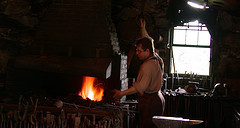They’re Longfellows (Feet, Part 2)

Blacksmith working the bellows (Photo credit: leewrightonflickr)
Today is the sequel to the post titled But Her Feet Show It, which featured the “answer poem” to This Is Just to Say by Williams.
This time, I answer The Village Blacksmith by Longfellow. My poem is first, but if you need to refresh your memory, you can scroll to the end where I have copied The Village Blacksmith.
A Note to the Village Blacksmith
Village blacksmith
how can I know you
without a name?
How can I explain to you the way I quiver
thinking of you
under that grand chestnut tree
your large sinewy hands
your brawny muscular arms
your tan face and long, black hair?
And then the quiet revelation that your
dear wife has died.
You, sitting there
among your boys in church
the tear in your eye
as your daughter sings.
Give me a name, please
for it is me you’re looking for
under the spreading chestnut tree
It’s me who can make you love again.
So far away in time
and place am I
in love with
the village blacksmith.
The Village Blacksmith
Under a spreading chestnut tree
The village smithy stands;
The smith, a might man is he,
With large and sinewy hands;
And the muscles of his brawney arms
Are strong as iron bands.
His hair is crisp, and black, and long,
His face is like the tan;
His brow is wet with honest sweat,
He earns what’er he can,
And looks the whole word in the face,
For he owes not any man.
Week in, week out, from morn till night,
You can hear the bellows blow;
You can hear him swing his might sledge,
With measure beat and slow,
Like a sexton ringing the village bell,
When the evening sun is low.
And children coming home from school
Look in the open door;
They love to see the flaming forge,
And hear the bellows roar.
And catch the flaming sparks that fly
Like chaff from a threshing floor.
He goes on Sunday to the church,
And sits among his boys;
He hears the parson pray and preach,
He hears his daughter’s voice,
Singing in the choir,
And it makes his heart rejoice.
It sounds to him like his mother’s voice,
Singing in Paradise!
He needs must think of her once more,
How in the grave she lies;
And with his hard, rough hands he wipes
A tear out of his eyes.
Toiing, — rejoicing, — sorrowing,
Onward in life he goes;
Each morning sees some task begin,
Each evening sees it close;
Something attempted, something done,
Has earned his night’s repose.
Thanks, thanks to thee, my worthy friend,
For the lesson thou has taught!
Thus at the flaming forge of life
Our fortunes must be wrought;
Thus on its sounding anvil shaped
Each burning deed and thought.
–Henry Wadsworth Longfellow
Don’t forget to visit my facebook fan page and hit like! Also, this week I am the featured author on a new website called Bookloads, a place to find books and learn about the authors. Thanks for reading and have a great day!




